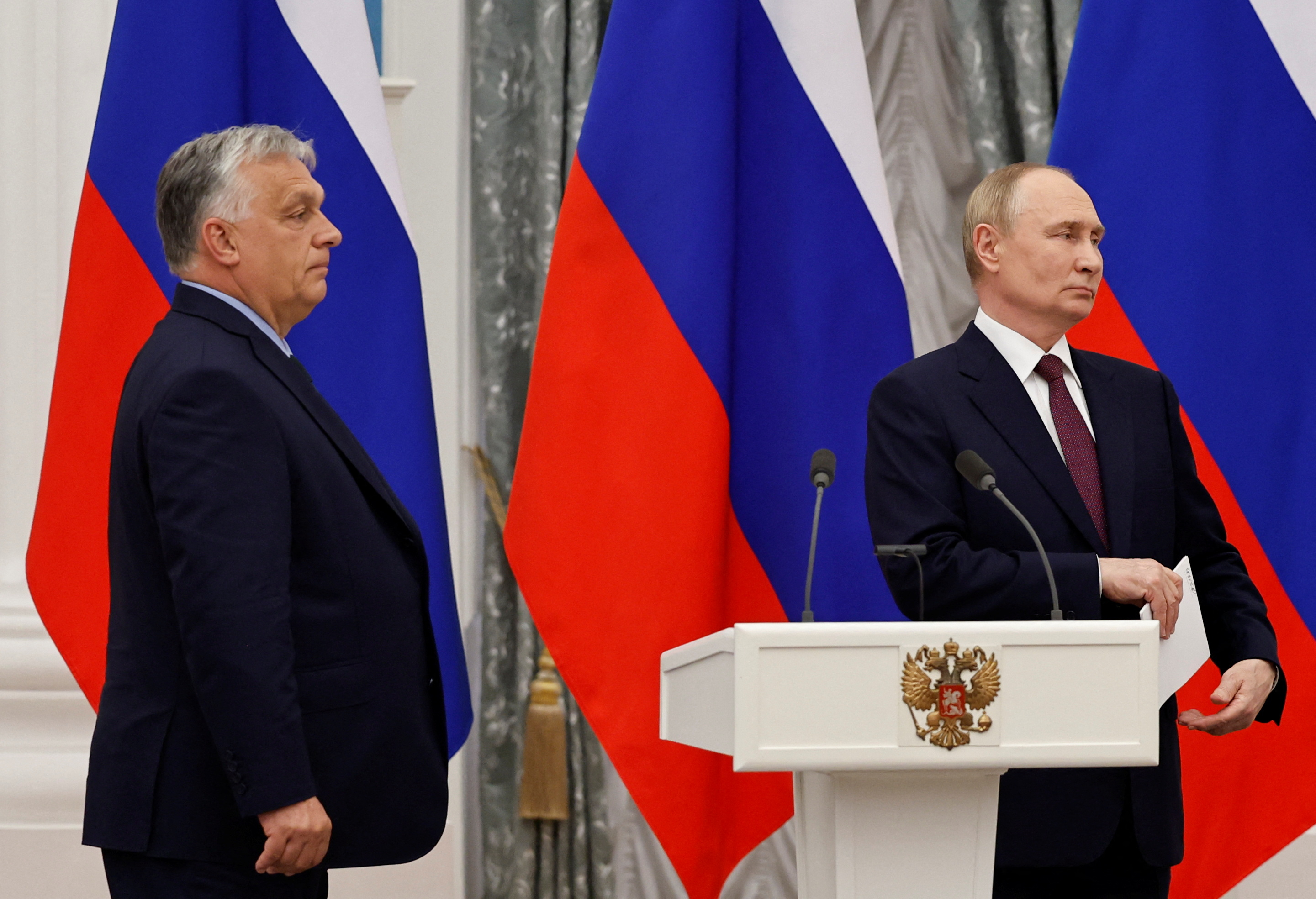Hungarian Prime Minister Viktor Orban held talks on a potential Ukrainian peace deal with Russian President Vladimir Putin on Friday, angering some European Union leaders who warned against appeasing Moscow andsaid he did not speak for the EU.
Hungary assumed the six-month rotating presidency of the bloc on Monday. Five days in and Orban has visited Ukrainian President Volodymyr Zelenskiy in Kyiv and formed the “Patriots for Europe” alliance with other right-wing nationalists.
Then he went to Moscow on a “peace mission”, days before a NATO summit that will address further military aid for Ukraine against what the Western defence alliance has called Russia’s “unprovoked war of aggression”.
It was the first meeting of an EU leader with Putin in Moscow since April 2022, two months after Moscow launched its full-scale invasion of Ukraine, and Orban’s first since then, although the two have met elsewhere.
Orban’s trip drew strong rebukes from fellow EU leaders and Ukraine said it had not been consulted beforehand.
European Commission President Ursula von der Leyen said that only unity and determination within the 27-nation EU would pave the way to a just and lasting peace in Ukraine”.
“Appeasement will not stop Putin,” she said on X.
Putin, who received Orban in the Kremlin, said the talks had been useful, but accused Ukraine of not wanting to end the two-and-a-half-year-old war and said his own ideas on how to end the conflict – which Ukraine has said are tantamount to surrender – were the way forward.
“Their implementation, it seems to us, would make it possible to stop hostilities and begin negotiations,” Putin told reporters.
“I have repeatedly said that we have always been and remain open to discussing a political and diplomatic settlement.
However, on the other side (of the conflict), we hear about the reluctance to resolve issues in this particular way.”
Putin said last month that Russia would end the conflict, which Moscow calls a special military operation to protect its own security, if Kyiv agreed to drop its aspirations to NATO membership and hand over the entirety of four provinces claimed by Moscow – demands Kyiv swiftly rejected as unacceptable.
Ukraine sees its 10-point peace plan and a recent international summit based on it as the only realistic path, and said Orban’s trip to Moscow was not coordinated with Kyiv.
“We remind you that for our state, the principle of ‘no agreements on Ukraine without Ukraine’ remains unshakable and (we) call on all states to observe it strictly,” Kyiv’s foreign ministry said in a statement.
‘SCEPTICISM’ OF HUNGARY’S MOTIVATIONS
Orban, a critic of Western military aid to Ukraine who has the warmest relations of any EU leader with Putin, said he recognised he had no EU mandate for the trip, but that peace could not be made “from a comfortable armchair in Brussels”.
“We cannot sit back and wait for the war to miraculously end,” he wrote on X.
Orban told reporters after the talks that Hungary viewed its temporary presidency of the EU over the “coming half a year, and the work that will be done then, as a peace mission”.
“This war is also reflected in the destruction of our economic development and the decline of our competitiveness. In short, I told the President (Putin) that Europe needs peace.”
Although many steps were needed to end the war and Moscow’s and Kyiv’s positions remained far apart, Orban said his trip had been the first step to restore dialogue.
An EU diplomat, speaking on condition of anonymity, said Orban’s trip meant that scepticism within the bloc about Hungary’s presidency was “unfortunately justified – it’s all about promoting Budapest’s interests”.
Lithuanian President Gitanas Nauseda accused Orban of undermining the EU presidency. “If you truly seek peace, you don’t shake hands with a bloody dictator, you put all your efforts to support Ukraine,” he wrote on X.
Estonian Prime Minister Kaja Kallas, who is set to become the next EU foreign policy chief, said Orban was exploiting the EU presidency position to sow confusion. “The EU is united, clearly behind Ukraine and against Russian aggression,” she said.
Hungarian Foreign Minister Peter Szijjarto hit back.
“Hungary is an independent country so I don’t think we should pay attention to such kind of criticism. Time has proven…that without dialogue, without keeping the channels of communication open, there is no solution to this war,” he said.
Hungary launched its EU presidency with a striking call to “Make Europe Great Again”, echoing former U.S. president Donald Trump, an Orban ally and sharp critic of the EU.
“We intend to leave a mark,” Orban’s spokesman Zoltán Kovacs said on Thursday before reports of the Moscow trip emerged. “The prime minister is going to use the presidency in a political way.”







Click here to change your cookie preferences